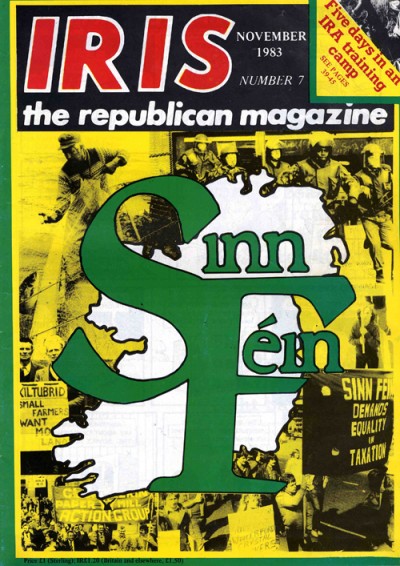Iris, No. 7

| Date: | 1983 |
|---|---|
| Organisation: | Sinn Féin |
| Publication: | Iris |
| Issue: | Number 7 November 1983 |
Contributors:
Info | Paddy Bolger, Sean Delaney, Jim Faulkner, Eibhlín Ní Gabhann, Jack Madden, Bernadette Quinn, Margaret Ward |
| Type: | Publication Issue |
| View: | View Document |
| Discuss: | Comments on this document |
| Subjects: | Section 31 of the Broadcasting Act |
Please note: The Irish Left Archive is provided as a non-commercial historical resource, open to all, and has reproduced this document as an accessible digital reference. Copyright remains with its original authors. If used on other sites, we would appreciate a link back and reference to The Irish Left Archive, in addition to the original creators. For re-publication, commercial, or other uses, please contact the original owners. If documents provided to The Irish Left Archive have been created for or added to other online archives, please inform us so sources can be credited.
Commentary From The Cedar Lounge Revolution
26th July 2010
Many thanks to Tommy Graham, editor of History Ireland , for donating this document to the Archive. Apologies for the size of the PDF [19mbs].
This document from Sinn Féin is perhaps most notable for the way in which it emulates the style of then-contemporary current affairs magazines like Magill. The overall layout is near-identical. In general terms it is a lavish production, with 60 pages. It contains cartoons, a six page report on an IRA training camp, and the contents is divided into various subjects from ‘Features’, ‘The Armed Struggle’, ‘Poetry’, ‘Book Reviews’ and ‘Foreign Affairs’.
The subject matter within each subject area is broad-ranging. An article by Paddy Bolger examines the strategies possible in the ‘Free State’. The issue of censorship is addressed by Bernadette Quinn. There is a clear identification with liberation struggles, ranging from feminism to anti-imperialism. Eibhlin Ni Gabhann considers womens groups in Belfast and Dublin. And Margaret Ward, who wrote Unmanageable Revolutionaries, expands upon the necessity for Republicans ‘to develop a non-elitist attitude of support for the feminist movement as an integral part of the liberation struggle’. This anti-imperialist approach is exemplified by an article on the West Bank with eye-witness account of the camp at Dheisheh.
The leading ‘Viewpoint’ article considers the 26 counties ‘A state but not a nation’ and argues that ‘the relation of a closed confessional state - in direct negation of all the principles of republicanism - has played a very significant role in turning the 26-county state inwards on itself’. It continues that the 26 counties ‘does however lack an essential ingredient for totally solidifying that stability - the ability to portray itself as something more than an apparently independent state, in short - to portray itself as a nation’.
It is an interesting thesis which is expanded upon further. ‘… The distinctive culture - a keystone of any nation - including the Irish language, is deliberately neglected and allowed to wither. Instead an alien mish-mash of mid-Atlantic culture is imported.’
It continues…
‘Equally, social values of the most conservative type, in keeping not with the historical spirit of the people, but rather with the objectives of the economic system, are sued as shackles to development. And economically, following the logic of this inability to create a truncated nation, the solutions are not sought within the state itself in the development of resources, but are sought from outside in attempts to attract multinationals or to beg from Brussels.’
And notably it suggests that…
Politically, all of this trend can easily be seen in the most recent developments. The so-called abortion referendum - which ignored the social problems surrounding abortion - was a reflex action of a long socially-repressed people, which in its underlining of the confessional state could not have caused any great dismay to the Free State upholders of partition, whatever their public position on that issue. That issue, as the question of divorce now is, was deliberately put into a fallacious context of ‘concession to the Northern Protestants’ rather than an examination of an actual social problem in the Free State, with the inevitable partitionist result’.
It continues later with the argument that:
In pursuing a strategy in the 26 counties, SF, which is a revolutionary party, therefore has to consider two major aspects. First.. It has to retain its republican analysis of partition as the major block to the development of a nation which can achieve political, economic, social and cultural justice. It therefore has to campaign against the present negations of that justice and attempt to build a revolutionary awareness of cultural pride and development… Secondly it has to communicate with the audience it wishes to reach in a way which that audience can, in today’s context, trust and understand. The proposition then that, somehow, republicans are bent on plunging the 26 counties into an armed revolution must be totally scotched. And the habit of republicans of isolating themselves in their political campaigning must be reversed.
And it concludes with the following:
The republican view of the elected institutions is not an excuse to stand aside from the political discussion altogether.
All told another fascinating addition to the Archive.

Comments
No Comments yet.
Add a Comment
Comments can be formatted in Markdown format . Use the toolbar to apply the correct syntax to your comment. The basic formats are:
**Bold text**
Bold text
_Italic text_
Italic text
[A link](http://www.example.com)
A link
You can join this discussion on The Cedar Lounge Revolution
By: Mícheál Mac Donncha Wed, 28 Jul 2010 10:19:40
In reply to WorldbyStorm.
I would argue that the majority of Dublin republicans at the time I joined in 1982 were left-wing; as far as I was – and am – concerned we were members of a strongly left-wing party. That was my clear understanding based firstly on my initial contact with the party which was through reading An Phoblacht from May 1981 onwards and also IRIS, and then through involvement in the Sinn Féin cumann in UCD and at Dublin level. Obviously the armed struggle was in progress, repression was intesne in the North and censorship in the South, so these dominated. While good people joined from People’s Democracy they did so because of Sinn Féin’s renewed emphasis on political action; they were not the drivers of change from within. In general terms younger activists were strongly behind the ending of abstentionism and the development of political strategy.
Reply on the CLR
By: Jim Monaghan Wed, 28 Jul 2010 11:12:05
Dublin SF was leftwing since the early 70s at least and before that they probably were as well. By the H-Block stage they were I would say more explicitly left. Paddy Bolger, Dermot Whelan with the inspiartion of Phil Flynn were drivers of this. They would predate the ex PDers. .Whelan (an ex Trotskyist) had at that stage a virulant hatred of Trotskyist caused by his experiences. Eire Nua was as t least as left as the left of the Labour Party. While not the only criteria the membership in Dublin was very workingclass. (shades of Tone’s comment).I remember the banned Provo march to welcome O’Conaill from gaol, I had been on the Mayday march before that, the Porvo one was more workingclass and the people on it were obviously poorer.
Whelan and Bolger went out of favour and Whelan lost his job in SF. He had given up a job in the Public Service to take it up.
I generally feel that sometime after the H-Block movement there was a move to safer pastures by SF. They were no longer interested in alliances with far left groups. This was in part an understandable reaction to some of the weirder nonsense we have discussed here. But in reality it represented a move towards the centre. I remember excuses being made for union bureaucrats who ran when asked to do something for the prisoners. They wanted alliances but with ICTU bureaucrats.
Funnily enough it made me remember the end of the openness in Official SF to left currents before that. History repeating itself.
Reply on the CLR
By: Neues aus den Archiven der radikalen (und nicht so radikalen) Linken « Entdinglichung Thu, 29 Jul 2010 09:16:27
[…] * Provisional Sinn Féin (PSF): IRIS – The Republican Magazine, November 1983 […]
Reply on the CLR
By: endüstriyel mutfak Thu, 29 Jul 2010 23:35:20
While good people joined from People’s Democracy they did so because of Sinn Féin’s renewed emphasis
Reply on the CLR
By: Ciarán Sun, 01 Aug 2010 10:50:37
In reply to Jim Monaghan.
The prison journal was called Iris Bheag. It came around later than IRIS, and as I recall the journal was replaced around 1990 by An Glór Gafa/The Captive Voice and An Camchéachta/The Starry Plough (not to be confused with the IRSP newspaper which I believe was defunct at that stage).
Reply on the CLR
By: AnonymousJournalEntries.com Wed, 04 Aug 2010 21:31:29
Scott M | 5 July 2010…
I found your entry interesting so I’ve added a Trackback to it on my Journal…
Reply on the CLR
By: Left Archive: Iris, the Republican Magazine, Easter 1991, Sinn Féin « The Cedar Lounge Revolution Mon, 27 Aug 2012 00:10:47
[…] thanks to Jim Monaghan for donating this to the Archive. This is an addition to the other copy of Iris published by Sinn Féin that is in the Archive. And being the Easter 1991 edition it commemorates […]
Reply on the CLR